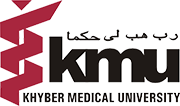KMU Launched Project on Mixed Reality Using Holo Lenses for Better Learning & Teaching in Medical Education
Khyber Medical University, (KMU) Peshawar in a joint venture with MCORPUS-SPRL (a Belgium based company) has initiated its pilot project on Mixed Reality Based Holograms of Human Body in Learning and Teaching in collaboration with the North-West School of Medicine (NWSM), Peshawar and Khyber Girls Medical College (KGMC), Peshawar. The mixed reality project is an advanced form of 3D system of studies where students in reality study the human anatomy on Holograms through specialized lens. Khyber Medical University is the second University in the world to adopt this programme and technology.
The project has been successfully launched under the supervision of Principal Investigator (PI) Dr. Asif Ali and Co PIs Dr Zilli Huma, Dr Najma Baseer, Dr Inayat Shah and Dr Yasar Yousafzai of KMU-Institute of Basic Medical Sciences. The inauguration ceremony was chaired by Vice Chancellor KMU Prof. Dr. Arshad Javaid where as Pro VC KMU Prof. Dr. Jawad Ahmed and Registrar KMU Prof. Dr. Muhammad Saleem Gandapur, Dean NWSM Prof. Dr. Ijaz Khattak and Dean KGMC Prof. Dr. Noor Wazir were also present at the occasion. The programme was attended by the faculty members of both the medical colleges and was termed as an exciting project aimed to increase the learning and insight of the knowledge for medical students. This project is anticipated to increase the knowledge, understanding and application of knowledge to common medical problems. Better learning by medical students will clearly improve the patients care and will improve the health system of our society.
The use of technology for learning and teaching purposes in medical education is rapidly evolving. The traditional models of learning and teaching have been replaced by high throughput technology models. Human bodies have been used for learning and teaching purposes. However, their availability is limited, rather rare. Technology from 2-D models moved to 3-D models for better learning and teaching in medical education has been introduced. However, the complexities of human body require even more powerful tools to know the relationship of organs and to ascertain how the body functions. In addition, the learning of how the disease pathology develops largely depends on knowing and understanding the normal anatomy and physiology.
Thus, to address the above mentioned issues, mixed reality models have been introduced. This model combines the real world with virtual reality in 3-D models. Augmented human bodies and organs could be visualized for more advanced learning. Students and staff can have access to the model from anywhere and anytime.
Students will be able to see the REAL LIFE; real-time functioning of organs and it is more intuitive. Students would be able to view 360 angles, inside/out of organs, automatic tutorials to guide how the organ function and tutorials on symptoms and cure of diseases. Moreover, the progress of students can also be assessed using growth analysis function of the model.
KMU under the leadership of Prof. Dr. Arshad Javaid is always bringing new and exciting projects to Khyber Pakhtunkhwa. This makes KMU a dynamic institute with a leadership role in health and education of not only KP but at the national and international level.
